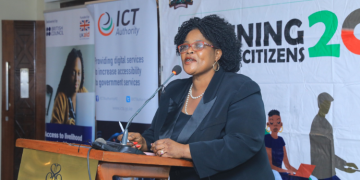Immigration and Citizen Services Principal Secretary Julius Bitok has clarified that the expiry of the new digital IDs dubbed maisha namba will not amount to a loss of citizenship.
In a statement sent to newsrooms on Friday, Bitok mentioned that the expiry of ID means that the bearer is required to renew the document after ten years.
Furthermore, he stated that the 10-year expiration date on the Maisha Card aligns with industry practices, international conventions, and accounts for technological wear and tear.
He added that it is also meant to factor in changes attributable to facial and other biometric features of the ID card holder over the years.
“The expiration of your ID does not diminish your citizenship status; it simply indicates that your ID needs to be renewed,” Bitok said.
The department noted that applicants seeking renewal of expired National ID cards will not be required to undertake fresh biometrics.
They will, however, retake their passport-sized photos due to potential changes in facial features over the years, according to the government.

PS Bitok Says Maisha Namba Registration is Voluntary
Bitok also ruled out the compulsory mass registration of Maisha Card on Thursday, August 29, saying the uptake will be voluntary.
He stated that the government banks on new digital ID card superior features to drive uptake adding that they will not tie Maisha card acquisition to the next general elections.
“It is not the government’s intention to compel individuals to apply for the Maisha Card. We want it to be voluntary, but it is advisable to consider obtaining it early.”
“Instead, it hopes to ride on the superior features of the new ID to encourage Kenyans to ditch their current documents and gradually transition to a digital version supported by Maisha Namba.”
However, the Current ID (2nd generation) will remain a valid registration document for all Kenyans.
PS Bitok Clarifies Claims of Rigging Elections
He rubbished the alleged link between the introduction of Maisha card and a plan to rig the 2027 election saying the earliest the 10-year expiry date will come to effect is 2033.
“This assertion is unfounded. The first Maisha card was printed in 2023. If you do the maths, you’ll clearly see that the first card to expire will be in 2033 long after the next election!’
This comes after the high court on August 12 set aside orders stopping any further roll out of the new digital identity cards.
Justice Lawrence Mugambi stated that maintaining the interim orders he issued last month was not in the public interest.
On July 25, Justice Mugambi issued an order prohibiting the government from rolling out the digital Identity cards.
Also Read: High Court Makes New Ruling on Rollout of Digital IDs
Civil Societies Decline Maisha Namba Rollout
This came following a petition filed by the Haki na Sheria Initiative, which challenged the mass collection, processing, and storage of data for the Unique Personal Identifier (Maisha Namba), 3rd Generation Identification Card (Maisha Card), Maisha Digital ID, and enrollment into the Maisha database on constitutional grounds.
Moreover, the judge emphasized the importance of preserving the basis of the petition adding that if the government continued with the rollout and the court later determined that rights had been violated, it would be difficult to remedy the situation.
Kenya’s civil society organizations have in the past expressed their opposition of the new personal identification number.
The groups expressed skepticism and concern over the validity and implications of the new identification model, terming it a scheme to rig the 2027 General election.
Also Read: Govt to Launch Digital IDs for Cows; Here is Why
Introduction of New IDs
Maisha Card and its supporting infrastructure, including the Unique Personal Identifier (Maisha Number), digital ID, and the National Integrated Personal Registration System (Maisha Database), were introduced in November 2023. T
Also known as the 3rd Generation ID, the card incorporates modern technology and biometric capabilities in line with international standards and global trends.
According to the State Department, the National Registration Bureau (NRB) has issued 972,630 Maisha cards (531,329 new applications and 441,301 duplicates).
Meanwhile, the government has launched a countrywide awareness campaign on proposed regulations to govern the issuance of new national ID cards and birth and death certificates.
According to the Immigration department, regional and country commissioners will coordinate the public and stakeholder participation forums on the draft regulations for the Registration of Persons Amendment Rules 2024 and the Birth and Death Registration Amendment Rules 2024 beginning next week.
Follow our WhatsApp Channel for real-time news updates!
https://whatsapp.com/channel/0029VaB3k54HltYFiQ1f2i2C

interior









































































